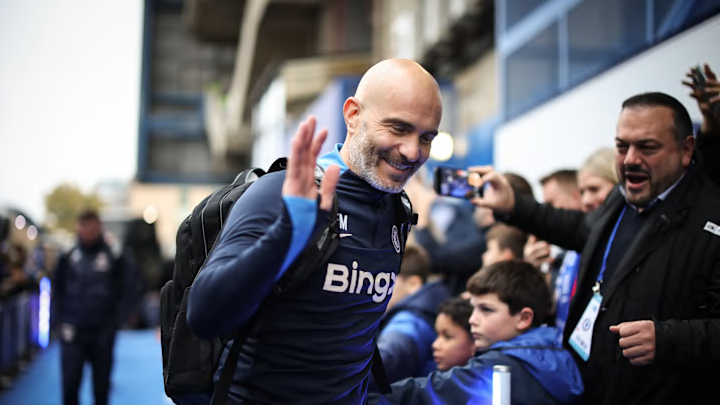Enzo Maresca’s recent interview with TNT Sports provided fascinating insights into his tactical philosophy and how his approach is shaping Chelsea. His tenure so far has shown promise, both in terms of results and the reduced chaos surrounding the club. In this article, The Pride of London will highlight key points from the interview and analyse their implications on Chelsea’s tactics and performance.
Controlling the Narrative Through Results
"It's a consequence of what you do inside the pitch, and then you can calm down the noises outside the pitch."Enzo Maresca
This sentiment resonates deeply, especially considering Chelsea’s tumultuous recent years. The relentless noise - be it criticism, scrutiny, or chaos - has been exhausting for fans and players alike. However, Maresca’s early results have been instrumental in quieting this chatter, creating a more stable environment around the club.
This stability is particularly crucial, as Maresca entered the season as a relatively unproven manager. A strong start was always going to be key in silencing doubts, and his tactical approach has delivered just that. His ability to deliver results, combined with the evident improvement in performances, has begun to win over skeptics.
Tactical Adjustments: Fullbacks as Surprise Attackers
A particularly intriguing tactical detail Maresca shared was how his fullbacks operate in advanced roles during settled possession. Instead of simply inverting, they position themselves to attack from the blindside of the opposition’s defensive midfielders. The idea here is to "surprise" the opposition markers, catching them off-guard with late movements into attacking positions.
Firstly, from a game plan perspective, I was very surprised with how the early periods of the match turned out. This, then translated to an overall theme of the game - Chelsea exerting possession control over Liverpool at Anfield.
— Fahd (@fahdahmed987) October 20, 2024
From the offset, the Blues wanted to control the… pic.twitter.com/ndv9Cp2vk3
This was quite fascinating to consider. While one might argue that opposition managers can prepare their players for this tactic, the in-game reality often tells a different story. Pressure, lapses in concentration, and quick transitions can still make this element of surprise effective. It’s a subtle yet impactful innovation in how Chelsea approach possession play.
Double Movements of the Chelsea Pivots
Maresca also touched on the positioning and movement of Chelsea’s double pivot - highlighting how crucial their ability to create passing channels is in unlocking defensive structures.
This was evident during Chelsea’s game against Liverpool. For instance, before Nicolas Jackson’s goal, Chelsea’s pivots (Moises Caicedo and Romeo Lavia) executed a clever double movement that broke through Liverpool’s first line of pressure. This created a channel ball that perfectly exploited Liverpool’s high defensive line, leading to a superbly worked goal. It’s a great example of how Maresca’s tactical planning emphasizes breaking lines and creating high-quality chances.
Nonetheless, Chelsea's attacking move really connected was for the goal. It's a move we saw a few times before the goal. We've also seen it previously lead to a goal (against West Ham). Where, Caicedo is found free in the middle against a high opp. backline. The Ecuadorian just… pic.twitter.com/tWbCGWsLUd
— Fahd (@fahdahmed987) October 20, 2024
Rest Defence and Adapting to Opponents
Maresca’s thoughts on rest defence were another compelling aspect of the interview. He explained how the profile of the opposition striker influences his defensive setup. For instance, against Nottingham Forest, Maresca opted to use Wesley Fofana - a more physical and aerially dominant defender - on Chris Wood. Levi Colwill, meanwhile, was deployed as the spare man, offering coverage in case Wood beat Fofana or to manage unmarked runners from midfield.
This strategic flexibility demonstrates Maresca’s attention to detail and his willingness to adapt his defensive structure based on the strengths of the opposition.
Chelsea 1:1 Nottingham Forest - Post-Match Analysis
— Fahd (@fahdahmed987) October 12, 2024
What began cautiously soon became a fast and furious battle, ending in a well-earned draw as neither side could pull ahead.
Tactical and Performance Analysis 🧵 pic.twitter.com/X7ygtA6O0O
The Lavia-Caicedo Pivot: Balancing Defence and Creativity
Maresca also discussed the role of having physically dominant defensive midfielders like Romeo Lavia and Moises Caicedo in a double pivot. This setup provides defensive solidity, which is crucial against top-quality sides. However, it does come at a cost - sacrificing some creativity in advanced areas.
Moises Caicedo has a bit of an underrated long ball efficiency - completing 75.9% (44/58) of his long passes as per @fbref in the Premier League this season.
— Fahd (@fahdahmed987) November 27, 2024
He's not there yet to be an elite long passer, but considering his age (23), this can be an area he significantly… pic.twitter.com/P7dM70v6SF
While this approach may draw criticism, it’s a necessary trade-off for achieving defensive balance in high-stakes games. Without such physical midfielders, Chelsea would struggle to maintain their defensive structure, especially against elite opposition.
Add to this, Romeo Lavia. A player of a very interesting mold. I really like him. I wonder how Maresca plans his future as well. Another high potential player who can play as a 6 and an 8.
— Fahd (@fahdahmed987) November 27, 2024
Need to see more of him now to judge how he could potentially play as a lone 6. From an… https://t.co/LuK1xQay0K pic.twitter.com/LcgrEP3k71
That said, Maresca hinted at future developments in this system. As Lavia and Caicedo grow more comfortable in their roles, there may be opportunities to integrate more creative players without compromising defensive stability. It’s an exciting prospect for Chelsea fans to look forward to.
Enzo Maresca’s interview offered a glimpse into his tactical acumen and how he is shaping Chelsea’s identity on the pitch. From managing external criticism through results to introducing innovative tactics and flexible defensive structures, Maresca is laying the groundwork for long-term success. While there’s still room for growth, the early signs are promising. Chelsea fans can take comfort in seeing their team finally entering a period of stability—on and off the pitch.
